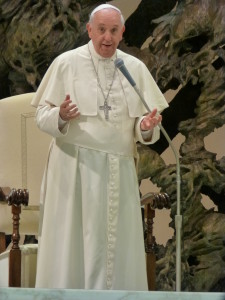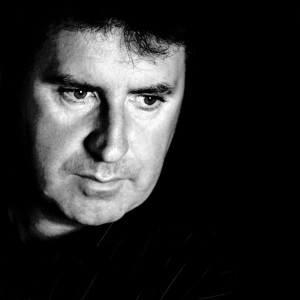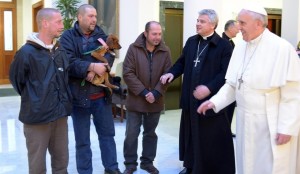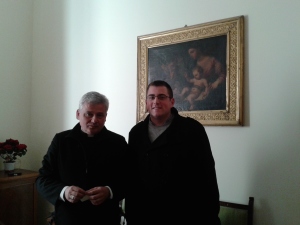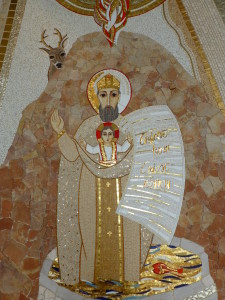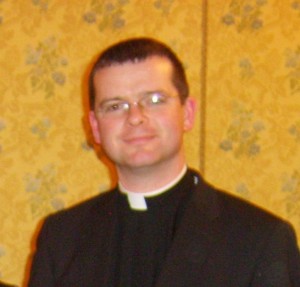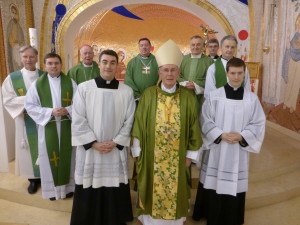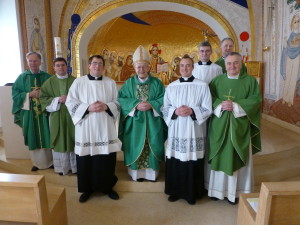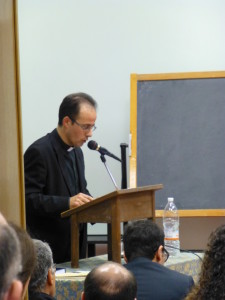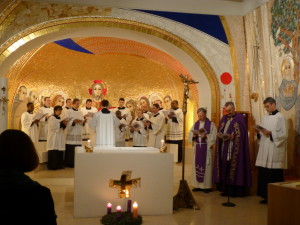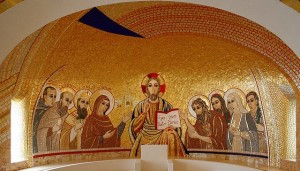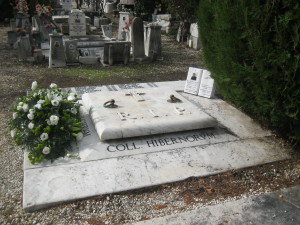Pope Francis talking with seminarians and priests
Posted on 24. May, 2014 by John Coughlan in Carousel
Pope Francis talks with seminarians and priests studying in Rome
On Monday, 12th May 2014 at the Paul VI Audience Hall at the Vatican, Pope Francis gave a special audience for seminarians and priests studying in Rome. The Irish College community was well represented at the occasion. In response to questions, he reflected with wisdom, wit, and passion on several dimensions of formation and priestly life.
Here are the questions and responses:
Good morning, and I thank you very much for this presence. I thank Cardinal Stella for his words, and I apologize for the delay. Yes, because the Mexican Bishops are here on their ad limina visit … and when one is with Mexicans, one feels so well, so well, that time passes without noticing it!
To the 146 of you who are from countries in the Middle East, and also to some of you from Ukraine, I want to say that I am very close to you at this moment of suffering: truly, very close, and in prayer. There is so much suffering in the Church; the Church suffers so much, and the suffering Church is also the persecuted Church in some parts, and I am close to you. Thank you. And now I would like…. There were some questions, I have seen them, but if you wish to change them or make them somewhat more spontaneous, there’s no problem, do so with all liberty!
Good morning, Holy Father. My name is Daniel. I come from the United States, I am a Deacon at the North American College. We have come to Rome above all for an academic formation and to keep faith in this commitment. How do we not neglect an integral priestly formation, either at the personal or community level? Thank you.
Thank you for the question. It is true; your main purpose here is academic formation: to get a degree in this or that…. However, there is the danger of academicism. Yes, the bishops send you here so that you can earn a degree, but they also do so in order that you may return to the diocese. However, in dioceses you must work in the presbytery as presbyters, graduate presbyters. And if one falls into this danger of academicism, it isn’t Father who returns but the “doctor”. And this is dangerous. There are four pillars in priestly formation: I have said this so many times, perhaps you have already heard it. Four pillars: spiritual formation, academic formation, community formation and apostolic formation. It’s true that here in Rome emphasis is placed — since this is why you were sent — on intellectual formation; however, the other three pillars must be cultivated, and all four interact among themselves, and I wouldn’t understand a priest who comes to get a degree in Rome and does not have a community life. This is not all right. Either he is not taking care of his spiritual life — daily Mass, daily prayer, lectio divina, personal prayer with the Lord — or his apostolic life: on the weekend doing something, for a change of air, but also the apostolic air, doing something there…. It’s true that study is an apostolic dimension; but it is important that the other three pillars are also looked after! Academic purism is not beneficial, it is not beneficial. And this is why I liked your question, because it gives me the opportunity to tell you these things. The Lord has called you to be priests, to be presbyters: this is the fundamental rule.
And there is something else that I would like to stress: if only the academic part is considered, there is a danger of sliding into ideologies, and this makes one sick. And it also sickens one’s conception of the Church. To understand the Church, one must understand her through study but also through prayer, through community life and through apostolic life. When we slide into an ideology and go down this road, we will have a non-Christian hermeneutic, a hermeneutic of an ideological Church. And this is harmful, it is an illness. One’s hermeneutic of the Church has to be the hermeneutic which the Church herself offers us, which the Church herself gives us. To perceive the Church with the eyes of a Christian; to understand the Church with the mind of a Christian; to understand the Church with the heart of a Christian; to understand the Church through Christian works. Otherwise one does not understand the Church, or understands her poorly. Therefore, yes, it is important to emphasize academic study because that is why you were sent here, but do not neglect the other three pillars: the spiritual life, community life and the apostolic life. I don’t know if this answers your question…. Thank you.
Good morning, Holy Father. I am Thomas from China. I am a seminarian at the Collegio Urbano. Sometimes living in community isn’t easy: what advice would you give us, based on your own experience, for making our community a place of human and spiritual growth and of the exercise of priestly charity?
Once, an old bishop from Latin America said: “The worst seminary is better than no seminary”. If one prepares for the priesthood alone, without a community, this is harmful. The life of the seminary, that is, community life, is very important. It is very important because there is sharing among brothers who are journeying towards the priesthood; but there are also problems, there are battles: battles for power, battles over ideas, even hidden struggles; and the capital vices arise: envy, jealousy…. And good things also arise: friendships, the exchange of ideas, and this is what is important for community life. Community life isn’t paradise, it’s at least purgatory — no, it’s not that … [they laugh], but it’s not paradise! A Jesuit saint said that the greatest penance for him was community life. It’s true, isn’t it? Therefore, I think we must go forward in community life. But how? There are four or five things that will help us a great deal. Never, never speak ill of others. If I have something against another, or if I don’t agreed with him: I have to tell him to his face! But we clerics are tempted not to speak to another to his face, to be too diplomatic, that clerical language…. However, it harms us, it harms us! I remember once, 22 years ago, I had just been appointed bishop and in that vicariate I had as secretary — Buenos Aires is divided into four vicariates — a young recently ordained priest. And in the first months, I did something, I took a somewhat diplomatic decision — too diplomatic — with the consequences that come from such decisions that are not taken in the Lord, no? And in the end, I said to him: “See what a problem this is, I don’t know how to put it in order…”. And he looked at me in the face — a young man! — and he said to me: “Because you acted wrongly, you did not make a fatherly decision”, and he said three or four strong things to me! He was very respectful, but he did say them to me. And then, when he left, I thought: “I will never remove him from the post of secretary: he is a true brother!” Instead, those who tell you lovely things to your face and then say not so lovely things behind your back… This is important… Gossip is the plague of the community; one must speak face to face, always. And if you do not have the courage to speak to someone’s face, speak to the Superior or to the Director. And he will help you, but don’t go to your companion’s rooms and speak ill of others! They say that gossip is something women are prone to, but also men, also us! We gossip enough! And this destroys the community. Then, it is something else to hear, to listen to different opinions and to discuss opinions, but well, seeking truth, seeking unity: this helps the community. Once my spiritual father… I was a student of philosophy; he was a philosopher, a metaphysician, but what a good spiritual father he was…. I went to him and the problem came out that I was angry with someone: “But I’m angry with him because of this, this and this …” I told my spiritual Father everything I had inside me. And he asked me only one question: “Tell me, have you prayed for him?”. Nothing more. And I said: “No”. He was silent. “We’re done”, he said to me. To pray, to pray for all the members of the community, but to pray primarily for those with whom I have a problem, or for those whom I don’t love, because sometimes not loving a person is something natural, instinctive. Pray, and the Lord will do the rest. But always pray. Community prayer. These two things — I don’t want to say too much — but I assure you that if you do these two things, the community will move forward, you can live well, speak well, discuss well, pray well together. Two small things: do not speak ill of others and pray for those with whom you have a problem. I could say more, but I think this is sufficient.
Good morning, Holy Father.
Good morning
My name is Charbel, I am a seminarian from Lebanon and in formation at the Collegio Sedes Sapientiae. Before asking my question, I would like to thank you for your closeness to our people in Lebanon and in the entire Middle East. My question is this: last year you left your country and homeland. What would you recommend to us for better managing our arrival and stay in Rome?
Well, it’s different … your arrival in Rome and my transfer of diocese: it’s somewhat different, but all right… I remember the first time I left [my country] to come to study here … First there is the novelty, it is the novelty of things, and we must be patient with ourselves. The beginning is like a wedding engagement: it’s all beautiful, ah, the newness, the newness of things…; but this should not be criticized, it’s how it is! This happens to everyone; things are this way for everyone. And then, returning to one of the pillars, first comes integration into the life of the community and into the life of study, directly. I have come for this, to do this. And then finding work for the weekend, an apostolic work, is important. Do not remain closed and do not be scattered. But the early days are the time for novelties: “I would like to do this, go to that museum, to this film, or to this or that.” Go ahead, don’t be worried, it’s normal for this to happen. But then, you have to get serious. What have I come to do? To study. Study in earnest! And take advantage of the many opportunities that this stay gives you. The newness of the universality: getting to know people from so many different places, from so many different countries, from so many different cultures. The opportunity to dialogue among yourselves. “But, what’s it like in your homeland? And what’s that like? And in mine it is ….”; and this exchange does great good, great good. I think I simply wouldn’t say more. Don’t be scared by the joy of the novelty: it’s the joy of the first engagement, before the problems begin. And go forward. Then, get serious.
Good morning, Holy Father. I am Daniel Ortiz and I am Mexican. Here in Rome I live in the Collegio Maria Mater Ecclesiae. Your Holiness, in fidelity to our vocation, we are in need of constant discernment, vigilance and personal discipline. How did you do this, when you were a seminarian, when you were a priest, when you were Bishop and now that you are Pope. And how would you advise us in this regard? Thank you.
Thank you. You said the word vigilance. Vigilance: this is a Christian attitude. Vigilance over one’s self: what is happening in my heart? Because where my heart is, there my treasure will be. What is happening there? The Eastern Fathers say that I must know well if my heart is in turmoil or if my heart is calm. The first question: vigilance over your heart: is it in turmoil? If it’s in turmoil, you can’t see what’s inside. It’s like the sea, no? When the sea is like this, one cannot see the fish … The first piece of advice, when your heart is in turmoil, is the advice of the Russian Fathers: go beneath the mantle of the Holy Mother of God. Remember that the first Latin antiphon is exactly this: in times of turmoil, take refuge under the mantle of the Holy Mother of God. It is the antiphon “Sub tuum presidium confugimus, Sancta Dei Genitrix”: It is the first Latin antiphon dedicated to Our Lady. It’s interesting, no? Be watchful. Is there turmoil? First go there, and wait there until there is a bit of calm: through prayer, through entrustment to Our Lady…. One of you might say to me: “But Father, in this time of such good modern advancements, of psychology, of psychiatry, in such moments of turmoil I think it would be better to go to a psychiatrist to help me …” I don’t rule this out, but first go to your Mother, because a priest who forgets his Mother, especially in moments of turmoil, he’s missing something. He is an orphan priest: he has forgotten his mother! And it’s in the difficult moments that a child always goes to his mother. And we are children in the spiritual life. Never forget this! To be watchful over the state of my heart. In times of turmoil, go to seek refuge under the mantle of the Holy Mother of God. So say the Russian monks and, in truth, so it is.
Then, what do I do? I try to understand what is happening, but always in peace — to understand in peace. Then peace returns and I can perform the discussio conscientiae. When I am in peace and there is no turmoil: “What happened today in my heart?”. And this is keeping watch. Keeping watch is not a matter of entering a torture chamber, no! It is watching one’s heart. We must bemasters over our heart. What does my heart feel, what does it seek? What made me happy today, and what didn’t make me happy? Do not end the day without doing this. As bishop, a question I would ask priests was: “Tell me, how do you get ready for bed?” And they didn’t understand. “But what do you mean by that?” “Yes, how do you end the day?” “Oh, destroyed, Father, because there’s so much work, the parish, so much … Then I have a little dinner, I take a bite and go to bed, I watch TV and relax a bit.” “And you don’t pass by the Tabernacle first?” There are things that make us see where our heart is. Never, never — and this is vigilance! — never end the day without spending a little time there, before the Lord, to reflect and ask yourself: “What happened in my heart?” In sad moments, in happy moments: what was that sadness about? How was that joy about? This is vigilance. Keeping watch also over one’s moments of depression and enthusiasm. “Today I’m down; I don’t know what is happening”. Keep watch: why am I down? Perhaps you need to go to someone who can help you…. This is vigilance. “Oh, I’m filled with joy!” But why am I joyful today? What happened in my heart? This is no sterile introspection, no, no! This is for the purpose of knowing the state of my heart, my life, how I am walking on the path of the Lord. For if there is no vigilance, the heart goes everywhere, and the imagination follows behind: “go, go …” and then one might not end up well. I like the question about vigilance. These are not ancient things of times past, we haven’t gone beyond these things. They are human things, and like all human things, they are timeless. We always carry them with us. Keeping watch over the heart was precisely the wisdom of first Christian monks; they taught this, to keep watch over the heart.
May I make an aside? Why have I spoken about Our Lady? I recommend to you what I said earlier, seek refuge…. A beautiful relationship with Our Lady, a relationship with Our Lady helps us to have a good relationship with the Church: both are Mothers … You know the beautiful passage of Saint Isaac, Abbot of Stella: what can be said of Mary can be said of the Church and also of our soul. All three are feminine, all three are Mothers, all three give life. The relationship with Our Lady is the relationship of a son … Keep watch over this: if one doesn’t have a good relationship with Our Lady, there is something of an orphan in my heart. I remember once, 30 years ago, I was in Northern Europe. I had to travel there to teach at the University of Cordoba, where at the time I was Vice-Chancellor. And a family of practicing Catholics invited me to their home; the country was a bit too secularized. And at dinner — they had many children, they were practicing Catholics, both were university professors, both were also catechists — at a certain point, speaking of Jesus Christ — enthusiasts of Jesus Christ! — I am talking about 30 years ago, they said: “Yes, thank God we have gotten past the stage of Our Lady …”. “How so?”, I said. “Yes, because we have discovered Jesus Christ, and we no longer need her”. I was somewhat pained; I didn’t understand well. And we spoke a little about this. This is not maturity! It is not mature. To forget one’s mother is something awful … To say it another way: if you don’t want Our Lady as Mother, you will certainly have her as a mother-in-law! And this is not good. Thank you.
Long live Jesus, long live Mary! Thank you, Holy Father, for your words about Our Lady. My name is Don Ignacio and I come from Manila, the Philippines. I am working on my doctorate in Mariology at the Pontifical Theological Faculty Marianum, and I reside at the Philippine Pontifical College. Holy Father, my question is this: the Church needs pastors who are able to guide, govern and communicate as today’s world requires us. How does one learn and exercise leadership in priestly life, taking on the model of Christ who humbled himself unto taking on the Cross, death on a Cross? Taking on the condition of servant unto death on the Cross? Thank you.
But your Bishop is a great communicator!
He is Cardinal Tagle …
Leadership … this is the heart of the question … There is only one road — then I will speak about pastors — but for leadership there is only one road: service. There is no other way. If you have many qualities — the ability to communicate, etc. — but you are not a servant, your leadership will fail, it is useless, it has not power to gather [people] together. Only service: to be at the service … I remember a very good spiritual father. People went to him, so much so that sometimes he couldn’t pray the whole breviary. And, at night, he would go to the Lord and say: “Lord, I didn’t do your will, or even my own! I did the will of others!” Thus the both of them — he and the Lord — consoled one another. Many times service means doing the will of others. A priest who works in a very humble district — very humble! — a villa miseria, a slum, said: “I would have to shut the windows, the doors, all of them, because at a certain point there are so so many who come to ask me for this spiritual thing, this material thing, that in the end I would want to shut everything. But this is not of the Lord,” he would say. It is true: you cannot lead a people where service is lacking.
The service of a pastor. A pastor must always be available to his people. A pastor must help the people to grow, to walk. Yesterday, in the Reading I was intrigued because the word “to push” was used in the Gospel. The shepherd pushes the sheep to go out and look for grass. I was intrigued: he makes them go out, he makes them go out with force! The original has this nuance:he makes them go out but with force! It’s like throwing them out: “go, go!” The pastor who makes his people grow and who always goes with his people. Sometimes, the pastor must go in front in order to indicate the way; at other times, must be among them to find out what is happening; and many times behind, to help those who are falling behind and also to follow the scent of the sheep that know where the good grass is. The shepherd … St Augustine says, taking up Ezekiel, must be at the service of the sheep and he underlines two dangers: the shepherd who exploits the sheep in order to eat, to make money, for economic and material interests; and the shepherd who exploits the sheep to dress well. Meat and wool, St Augustine says. Read that beautiful sermon De pastoribus. We need to read and reread it. Yes, these are the two sins of pastors: money, that they become rich and do things for money — profiteer pastors. And vanity, pastors who believe they are in a superior state to their people, detached … let’s think, prince pastors. The profiteer pastor and the prince pastor. These are the two temptations of which St Augustine speaks in his sermon, taking up the passage of Ezekiel. It is true, a pastor who seeks himself, be it by way of money or by way of vanity, is not a servant, he has no true leadership. Humility must be the shepherd’s weapon: humble, always at the service of others. He mustseek to serve. And it’s not easy to be humble; no, it’s not easy! The Desert Monks say that vanity is like an onion: when you pick up an onion, and begin to peel it; and you feel vain, you begin to peel away your vanity. And you go, and go, to another layer, and another, and another, and another … and ultimately you arrive at …nothing. “Ah, thank God, I’ve peeled the onion, I’ve peeled away my vanity”. Do this, and you’ll smell like an onion! So say the desert Fathers. This is what vanity is like. Once I heard a Jesuit — good, he was a good man — but he was so vain, so vain … And we all told him: “you’re vain!”. But he was so good that we all forgave him. And he went to do the Spiritual Exercises, and when he returned, he said to us, in community: “What beautiful exercises! I spent eight days in Heaven, and I discovered that I was so vain! But, thank God, I have overcome all my passions!” Vanity is like this! It is so difficult to remove vanity from a priest. The people of God will forgive you many things: they will forgive you if you have had an emotional slip, they will forgive you. However, they will not forgive you if you are a pastor attached to money, if you are a vain pastor who does not treat people well. For someone who is vain does not treat people well. Money, vanity, pride: the three steps that lead you to all the sins. The people of God understand our weaknesses, and forgive them; but these two they do not forgive! They do not forgive attachment to money in a pastor. And if they aren’t treated well, they don’t forgive this. It’s curious, isn’t it? We must battle against these two defects in order not to have them. Then, leadership must enter into service, but with a personal love for the people. I once heard about a parish priest: “That man knew the name of all the people of his district, even the names of the dogs!”. It is beautiful! He was close, he knew each one, he knew the history of all the families, he knew everything. And he helped. He was so close … Closeness, service, humility, poverty and sacrifice. I remember the old parish priests in Buenos Aires, when there were no mobile phones or answering machines; they slept with the telephone beside them. No one died without the Sacraments. People rang them at any hour, they got up and went. Service, service. And as Bishop, it pained me when I called a parish and the answering machine answered … That’s no leadership! How can you lead a people if you don’t hear them, if you are not at their service? These are the things that come to me, not much… not well ordered, but they are meant to answer your question….
Good morning, Holy Father.
Good morning.
My name is Don Sérge, I’m from Cameroon. My formation is taking place at the College of St Paul the Apostle. Here is my question: when we return to our dioceses and communities, we will be called to new ministerial responsibilities and new formative tasks. How can all the dimensions of the ministerial life coexist in a balanced way: prayer, pastoral commitments, formational obligations, without neglecting any one of them? Thank you.
There is a question I didn’t answer: it eluded me, perhaps — being irresponsible is dishonest! — and I want to connect it with this one. They were asking me: “How do you do these things as Pope?”. And yours… I will answer yours by recounting with complete simplicity what I do, so as not to neglect anything. Prayer. In the morning I try to pray Lauds and spend a little time in prayer inlectio divina with the Lord. When I get up, I first read the “coded messages”, and then I do this. And then, I celebrate Mass. Then the work begins: one day it’s one kind of work and another day it’s something else … I try to do one thing at a time. Lunch is at noon, then a little siesta. After the siesta, at three o’clock — excuse me — I say Vespers, at three…. If they aren’t said then, they won’t be said at all! There’s also reading, the Office of Readings for the next day. Then afternoon work, the things I am obliged to do…. Then, I spend a little time in Adoration and pray the Rosary; dinner, and then I’m done. That’s how it goes.
But sometimes not everything gets done, because I let myself be led by imprudent demands: too much work, or thinking that if I don’t do this today, I won’t do it tomorrow … Adoration falls by the wayside, my siesta falls by the wayside, this or that falls by the wayside …. Even here one must be vigilant: you will return to your dioceses and what happens to me will happen to you: it’s normal. Work, prayer, a little time for rest, get out of the house, take a walk, all of this is important … but you must regulate it through vigilance and also through good advice…. It is ideal to finish the day tired: this is ideal. You shouldn’t need to take pills, to end tired. However, with good tiredness, not imprudent tiredness, because that’s bad for one’s health and, in the long run, one pays dearly for this. I look at Sandro’s face, who laughs and says: “But you don’t do this!” It’s true. This is the ideal, but I don’t always do it, because I am also a sinner, and I’m not always that organized. But this is what you should do …
Good morning, Holy Father. I am Fernando Rodriguez. I am a new priest from Mexico. I was ordained one month ago, and I live at the Mexican College. Holy Father, you have reminded us that the Church is in need of a New Evangelization. In fact, in your [Apostolic Exhortation] ‘Evangelii Gaudium’, you reflected on the preparation for preaching, on the homily, and on the proclamation as a form of passionate dialogue between a pastor and his people. Can you return to this subject of the New Evangelization? Also, Your Holiness, we would like to ask you how a priest should be for the New Evangelization. What should he be like? Thank you.
It was at Santo Domingo in ‘92 when St John Paul II spoke about the New Evangelization — I thought it was the first time but afterwards I was told that it wasn’t the first time. He said that it needs a new methodology, a new ardour, renewed apostolic zeal, and I don’t remember the third … Who remembers it? Expression! To look for an expression that is in keeping with the singularity of the times. And for me, in the Aparecida Document it is very clear. The Aparecida Document develops this well. For me, evangelization requires going out of oneself; it requires the dimension of transcendence: the transcendent in the adoration of God, in contemplation, and transcendence toward our brothers and sisters, toward the people. To go forth, go forth! For me this is the kernel of evangelization. And going forth means going somewhere, i.e., closeness. If you don’t go out of yourself you will never reach closeness! Closeness. To be close to people, to be close to everyone, to all those to whom we should be close. All people. Go forth. Closeness. One cannot evangelize without closeness! Closeness with kindness; the closeness of love, also physical closeness; to be close to another. And here you made a connection to homilies. The problem with boring homilies — so to speak— the problem with boring homilies is that there is no closeness. It is precisely in the homily that we measure a pastor’s closeness to his people. If in the homily you speak, let’s say, 20, 25 or 30, 40 minutes — these aren’t fantasies, this happens! — and you speak of abstract things, of truths of the faith, you are not delivering a homily, you are playing school! That is different! You are not close to the people. That is why the homily is important: calibrate it, get an idea of how close the priest is. I think that in general our homilies aren’t good, they do not really belong to the homiletic literary genre: they are conferences, or they are lessons, or reflections. But a homily — and ask your theology professor about this — the homily at Mass, the Word of Almighty God, is a sacramental. For Luther it was almost a sacrament: it was ex opere operato, the Word preached; for others, it is only ex opere operantis. However, I think it is somewhere in the middle, a bit of both. The theology of the homily is somewhat sacramental. It is different than saying words about a topic. It’s something more. It implies prayer, it implies study, it implies knowing the people to whom you will speak, it implies closeness. Regarding the homily, for evangelization to succeed we must move far ahead, we are behind. It is one of the points where today the Church stands in need of conversion: prepare our homilies so that people can understand them. And after eight minutes, one’s attention span is exhausted. A homily shouldn’t be longer than eight or ten minutes. It should be brief, it should be firm. I recommend two books to you; they are from my day, but they are good on this aspect of preparing homilies; they will help you very much. First, The Theology of Preaching by Hugo Rahner. Not Karl, but Hugo. One can read Hugo easily; Karl is difficult to read. This is a jewel: The Theology of Preaching. And the other is that of Fr Domenico Grasso, which introduces us to what a homily is. I think it has the same title: Theology of Preaching. This will help you quite a lot. Closeness, the homily…. There is something else I wanted to say…. Go forth, be close, make the homily the measure of how close I am to the People of God. And another category I like to use is that of the peripheries. When one goes forth, one shouldn’t just go halfway, he has to go all the way, to the end. Some say that one has to begin evangelizing with those who are furthest away, as the Lord did. This is what comes to me to say about your question. This matter of the homily is true: for me it is one of the problems which the Church needs to study and be converted. Homilies, homilies: they are not school lessons, they are not conferences, they are something else. I like it when priests get together for two hours to prepare the coming Sunday’s homily, because it gives them an atmosphere of prayer, of study, of exchange of opinions. This is good, it is very beneficial. Preparing it together with someone else is very good.
Praised be Jesus Christ! My name is Voicek, I live in the Pontifical Polish College, and I’m studying moral theology. Holy Father, regarding the priestly ministry at the service of our people, after the example of Christ and his mission, how would you advise us to remain available and happy in the service of God’s people? What human qualities do you suggest and recommend that we cultivate in order to be images of the Good Shepherd and to live what you have called “the mysticism of encounter”?
I have spoken principally about things that one must do in prayer. However, I’ll pick up on the last thing you said, to add something to all that I’ve said and that has been said and that may lead right to your question. You said: “The mysticism of encounter”. Encounter. The capacity for encounter. The ability to hear, to listen to other people. The ability to seek together the way, the method, so many things. This encounter. And it also means not being frightened, not being frightened of things. The good shepherd must not be frightened. Maybe he feels fear inside, but he is never really scared. He knows that the Lord comes to his aid. Encounter the people entrusted to your care as a pastor; encounter your Bishop. The encounter with your Bishop is important. It is also important that the Bishop allow himself to be met. It’s important … because, yes, sometimes one hears: “Have you told this to your Bishop? Yes, I requested an audience, and I requested an audience four months ago. I am still waiting!” This is not good. Go to the Bishop and may the Bishop allow himself to be found. Dialogue, and I would especially like to speak of one thing: the encounter among priests, among yourselves. Priestly friendship: this is a treasure, a treasure that we must cultivate among ourselves — friendship among you, priestly friendship. Not everyone can be close friends. But how beautiful a priestly friendship is! When priests, like two brothers, three brothers, four brothers, know one another, talk about their problems, their joys, their expectations, many things… priestly friendship. Seek this, it is important. Be friends. I think this helps a great deal in living the priestly life, the spiritual life, the apostolic life, community life and also the intellectual life: priestly friendship. If I were to meet a priest who said to me: “I have never had a friend”, I would think that this priest has not had one of the most beautiful joys of the priestly life: priestly friendship. This is my hope for you. I hope that you be friends with those whom the Lord places along your path as friends. I wish you this in life. Priestly friendship is a force for perseverance, apostolic joy, courage, and even for humour. It is beautiful, most beautiful! This is what I think.
I thank you for your patience! And now we can pray to Our Lady, asking for her blessing …
Regina Caeli …
Source:
http://w2.vatican.va/content/francesco/en/speeches/2014/may/documents/papa-francesco_20140512_pontifici-collegi-convitti.html
For pictures of the occasion from the Irish College Flickr site, click here.
A Time for Song and Silence – Retreat for Music Ministers
Posted on 23. May, 2014 by John Coughlan in Carousel
Set in the historic city of Rome and the beautiful setting of the Irish College, this second retreat took place from 16th to 23rd July 2014 and offered to the participants involved in music ministry an opportunity to nourish their own spirits and take time to reflect on the mystery behind the ritual. Each day, participants had an opportunity for communal and private prayer with a music-based workshop offering new resources. Participants experienced the celebration of the liturgy in the beautifully refurbished Chapel of the Irish College and also had the opportunity to celebrate the liturgy in some of the beautiful historic sites of Rome, experiencing much of the culture of this ancient city.
Fr Liam Lawton: Retreat Director
From the Diocese of Kildare and Leighlin, Fr Liam Lawton was the retreat director. An established composer of sacred music, his latest compositions are a new setting of the Mass in the Irish language, Aifreann Mhuire na nGael, and a new liturgical collection, Eternal.
Music coordinator: Ms Julianne Woods
Daily Timetable: 8.00am – 9.00am Breakfast
9.30am Morning Prayer
10am – 11.30am Music workshop
11.30 – 12pm Coffee break
12pm – 1pm Quiet time & Adoration
Afternoons & evenings: Trips to places of historical interest, day trip away, visit to prayer experience in Rome, Taizé Evening, prayer, quiet time.
Lent 2014 – College Charity: Papal Almonry
Posted on 21. Mar, 2014 by John Coughlan in Carousel
This year, the Irish College seminarians have decided to dedicate the College’s Lenten charity to the work of the Papal Almoner, the Elemosiniere, Archbishop Konrad Kajewski. This will be a chance to contribute directly to Pope Francis’s outreach to the poor. There will be collection boxes in the loggia, and so it will be possible for all who come to 10am Mass on Sundays to make a contribution.
‘Each individual Christian and every community is called to be an instrument of God for the liberation and promotion of the poor, and for enabling them to be fully a part of society. This demands that we be docile and attentive to the cry of the poor and to come to their aid. A mere glance at the Scriptures is enough to make us see how our gracious Father wants to hear the cry of the poor: “I have observed the misery of my people who are in Egypt; I have heard their cry on account of their taskmasters. Indeed, I know their sufferings, and I have come down to deliver them… so I will send you…” (Ex 3:7-8, 10). We also see how he is concerned for their needs: “When the Israelites cried out to the Lord, the Lord raised up for them a deliverer” (Jg 3:15). If we, who are God’s means of hearing the poor, turn deaf ears to this plea, we oppose the Father’s will and his plan; that poor person “might cry to the Lord against you, and you would incur guilt” (Dt 15:9). A lack of solidarity towards his or her needs will directly affect our relationship with God: “For if in bitterness of soul he calls down a curse upon you, his Creator will hear his prayer” (Sir 4:6). The old question always returns: “How does God’s love abide in anyone who has the world’s goods, and sees a brother or sister in need and yet refuses help?” (1 Jn 3:17). Let us recall also how bluntly the apostle James speaks of the cry of the oppressed: “The wages of the labourers who mowed your fields, which you kept back by fraud, cry out, and the cries of the harvesters have reached the ears of the Lord of hosts” (5:4).’
– Pope Francis, Apostolic Exhortation, Evangelii gaudium, paragraph 187
Thanks to all who contributed to this collection. The total amount collected was €2,360.89.
St Patrick’s Day 2014
Posted on 09. Mar, 2014 by John Coughlan in Carousel
St Patrick’s Day 2014
In the morning, the St Patrick’s Day Mass for the Irish community in Rome and visitors was celebrated in St Isidore’s Church, Via Degli Artisti, 41, at 10.30. Monsignor Ciarán O’Carroll, Rector was the principal celebrant.
This year, there was a celebration of Vespers in the College Chapel at 19.30, followed by entertainments and refreshments afterwards. A visiting choir, Cór na nÓg Caisleán Ruairí from Rostrevor, Co. Down, led by Dr Eibhlis Farrell, performed at the entertainments after.
To see photographs from the day, click here.
Doctoral Defence
Posted on 24. Feb, 2014 by John Coughlan in Carousel
Congratulations to Fr Enda Murphy (pictured above) of the Diocese of Kilmore, a former seminarian and postgraduate student of the Irish College, who successfully defended his doctorate at the Pontifical Athenaeum San Anselmo on 24th February 2014. His thesis is entitled ‘Ritus ad Catechumenos Faciendos: A liturgical-theological study of the rite of acceptance into the order of catechumens in the Ordo Initiationis Christianae Adultorum’.
Admission to Candidacy & Golden Jubilee
Posted on 19. Feb, 2014 by John Coughlan in Carousel
Admission to Candidacy for Diaconate and Priesthood
and Golden Jubilee of Cardinal Seán Brady and Archbishop Dermot Clifford
Two seminarians of the Pontifical Irish College, Rome, Conor McCarthy of Down and Connor and Marius O’Reilly of Cork and Ross, were admitted to Candidacy for Ordination to Diaconate and Priesthood by Cardinal Seán Brady at Mass in the College Chapel on Wednesday, 19th February 2014. Pictured (left to right) are: Fr Thomas Norris (Spiritual Director), Fr Hugh Clifford (Director of Formation), Archbishop Dermot Clifford (Cashel), Marius O’Reilly (new Candidate), Bishop Francis Duffy (Ardagh and Clonmacnois), Cardinal Seán Brady (Armagh), Monsignor Ciarán O’Carroll (Rector), Stephen Duffy (College Master of Ceremonies), Fr George Hayes (Vice Rector), Conor McCarthy (new Candidate). Cardinal Seán Brady and Archbishop Dermot Clifford, alumni of the College, and now College Trustees, are celebrating the golden jubilee of their ordination to the Priesthood in the Lateran Basilica on 22nd February 1964.
To see photographs of the occasion, click here.
Homily of Cardinal Seán Brady at the Mass
Some years ago I was in Springfield, Illinois, USA. There they proudly boast of one Barack Obama. He had come to the city for a visit in the footsteps of Abraham Lincoln to declare his candidacy for the presidency of the United States of America, on the steps of the State Building. This evening we gather to witness Conor and Marius being admitted as Candidates for something far more important and enduring – candidates for sacred orders. In bygone years, the McCarthys were princes of Munster in Cork, but Conor’s branch obviously moved north to Down and Connor in Ulster! While the O’Reillys were princes of Breifne in Ulster, before Marius’s family moved south to Cork!
In any case, we are here to support these ‘princes’ Marius and Conor with our prayer as they declare their desire to be ordained deacons and priests. I know they have prayed and reflected long and hard about this decision. They have shown by their lifestyle that they are willing to match their words with their action, as students, as they generously place their many gifts and their talents at the service of the Lord and at the service of the poor and of the College community in many ways over recent years. We rejoice and congratulate them on being called. We are glad to be here to accompany them with our prayer that they not only be aware of the presence of the Lord in their lives at all times but that the Lord may fill their hearts with joy as they encounter him once more in this decisive step on their vocational journey.
When Archbishop Clifford and I came here in the year of Our Lord 1960. Good Pope John XXIII was Pope. There was no ceremony of Admission to Candidacy for Sacred Orders. Instead, there was a ceremony of Tonsure, which involved a cutting of hair. Pope John thought it would be a good idea if those who had received Tonsure when getting a haircut would get the barber to shave a spot on the head to indicate our trust in the Lord and our commitment. It did not last long but I think that we can still reflect by our lives our commitment to the poor and all God’s people.
Today the 19th of February I celebrate 19 years as a Bishop. I’m pleased that Fr Michael Toner, the diocesan secretary and Chancellor of the Archdiocese of Armagh is here, as well as Fr Brian McCanny, former student and Director of Formation in the College and of course Francis Hand, whom I congratulate on his recent institution as an Acolyte, and Bishop Francis Duffy, the new Bishop of Ardagh and Clonmacnois. So this is a day of humble prayer and for forgiveness for my many failings in situations and for opportunities missed.
After 19 years of celebrating the Sacrament of Confirmation, I now realise now more clearly how the Spirit comes over and over again:
-to make us more fully Sons of God the Father
– to make us become more clearly brothers and sisters of Jesus Christ
– to enable us become all the more temples of the Holy Spirit and enlivened by this Gift
– to make us full members of the Church
and finally, something dear to the heart of Pope Francis, to send us forth as missionaries to bring Good News.
The Word of God as usual throws so much light on what is going on here. The Church, the Body of Christ is called to continue the Ministry of Christ, especially his healing ministry each day. We strive to let Christ heal our own blindness and to open our eyes to the wonders of his loving plan for us. In this evening’s Gospel Jesus gradually restored his sight to the blind man of Bethsaida. In the same way Jesus gradually reveals to each one of us his plan for us and prepares us to assume our responsibilities, and to play our part and do the work that we have been placed on the Earth to do. In the Gospel we heard, some people brought a blind man to Jesus and begged him to touch him.
Conor and Marius, so much of your life’s work will be just that: bringing people to Jesus so that they can see and touch him, bringing people who cannot see Jesus, those who cannot see meaning or purpose in their lives, letting him touch their minds with his truth and to touch their hearts with his love. It is his work. When all is said and done we are only God’s instruments. A couple of questions suggested themselves to me from this Gospel.
Why did Jesus lead the blind man out of the village of Bethsaida to work the miracle outside the village? Why did he send him home with the order, “Don’t even go into the village”? Was it because the villagers were not ready for the kind of Messiah Jesus was going to be? Was there a chance that they would not understand and therefore that they would refuse him and reject it? What is that saying about our own lives as Priests, Deacons and Bishops – in preparing people to receive Jesus and to welcome him, to recognise him and to announce him.
I am delighted that Archbishop Clifford and I can be together here in Rome this week as we prepare to celebrate the 50th anniversary of our Ordination to the Priesthood in the Lateran Basilica on Saturday 22nd February 1964. There were 11 in our class. Three have died. May they rest in peace. One is a Benedictine monk and the rest of us are struggling on as best we can towards eternity. On a day like this we give thanks first of all to God the giver of all good gifts and to our parents and families and dioceses, and to our colleagues, to our various alma maters, but especially on this occasion to the loving mother, the Irish College, to its staff and students. I spent 16 years of my 50 years of priesthood here. One of the outstanding events was the canonisation of St Oliver Plunkett, a past student of the College, ordained for the Diocese of Meath. He had spent many years in this city teaching. He had a difficult time as Archbishop of Armagh and suffered martyrdom for his faith on the scaffold at Tyburn in 1681. Another happy occasion was the Beatification of Dom Columba Marmion, another past student of the College, ordained for the Archdiocese of Dublin, who later became a Benedictine monk and Abbot of Maredsous and a master of the spiritual life and the encounter with Christ. Another great event is coming up, the Canonisation of Blessed John Paul II, who visited the College and visited our homeland very early on in his long Pontificate. All of this reminds us that the purpose of our being priests is to direct ourselves and others to holiness and to Sainthood.
My good wishes go to the Rector, staff, and community of the College. Let’s keep with what St James advises in this evening’s first reading, what God the Father considers to be pure and unspoilt religion, which is to care for the orphans and widows and those suffering and to keep oneself from being contaminated by the world. Conor and Marius, I think that the pastoral work which you have undertaken lives up to this. You have devoted yourselves to pure unspoilt religion ahead of passing pleasures. We wish you well for the future. Buon proseguimento! Blessings and joy now on the road to Ordination.
Ministry of Acolyte 2014
Posted on 19. Jan, 2014 by John Coughlan in Carousel
Two seminarians of the Pontifical Irish College, Rome, were instituted in the Ministry of Acolyte by Cardinal Walter Kasper, President Emeritus of the Pontifical Council for Promoting Christian Unity, on Sunday, 19th January 2014. The new Acolytes are: Francis Hand (Archdiocese of Armagh) and Daniel Gallagher (Diocese of Galway, Kilmacduagh and Kilfenora).
The photograph taken after the Mass shows: (Left to right) Fr Tom Norris (Spiritual Director), Fr Hugh Clifford (Director of Formation), Mr Daniel Gallagher (new Acolyte), Cardinal Walter Kasper (President Emeritus of the Pontifical Council for Promoting Christian Unity), Mr Francis Hand (new Acolyte), Mr Stephen Duffy (Master of Ceremonies), Fr George Hayes (Vice Rector), Monsignor Ciarán O’Carroll (Rector).
To see more photographs of the occasion, click here.
Homily of Cardinal Walter Kasper,
President Emeritus of the Pontifical Council for Promoting Christian Unity
at the Institution of Acolytes,
Pontifical Irish College, Rome,
Sunday, 19th January 2014
Dear friends!
The wonderful Gospel passage of this second Sunday of Ordinary Time within the liturgical year is exactly the best you could find for this celebration of installation to the ministry of acolytes. It is a passage which played an important role also in my personal biography and in my vocation to become a priest. As the first disciples of Christ remembered the exact hour, it was about four o’clock in the afternoon, I remember the sermon I heard on this passage when I was about sixteen years old.
The first disciples heard the words of John the Baptizer, “There is the Lamb of God!” But they were still unsure. Timidly they followed Jesus, and when Jesus turned to them and asked them, “What are you looking for?” they answered, a little perplexed: “Rabbi, where are you staying?” Jesus told them only: “Come and see!”
“Come and see!” That’s also the invitation to you, who will be installed in this celebration as acolytes. Though the term acolyte doesn’t occur directly in the Bible, indirectly it occurs very often. Jesus called all his first disciples: Akolouthei moi! This means: “Follow me!” And they, as the Gospel of today tells us, when they heard the call of Jesus, without any further questions and dispute, stood up, left everything and followed Jesus wherever he went. So an acolyte is a follower of Jesus.
My dear friends, you have heard this call already in your Baptism and in your Confirmation. Now the call is repeated: Jesus says to you: “I want you.” Now the call becomes more intensive, more urgent, more concrete. Jesus invites you to stay with him. He wants you as his housemates and his friends. Friendship is not only a matter of sentiments, not only a matter of nice comradeship. To be a friend means to share the same interest, and more: the same values, the same ideals, the same life.
So you have a decision, where you want to stay in your life. It is the decision St Ignatius describes in his Spiritual Exercises, as the decision between two banners: the glory of this world – wealth, career, success. Or, on the other side: apostolic life, what it means to go out and go beyond our own interests, to leave our own home and to live where he is at home, to give up the many beauties of human life and to walk together with him on the narrow and steep way, which finally is the way toward the cross, because the servant cannot be greater than his master. But as we believe, the way of the cross is the way to the new life and joy of Easter.
Pope Francis makes it very clear, when he speaks against fashionable spirituality. He is convinced: Today the Church in the West is in crisis, but our world is in an even deeper crisis and cannot find a way out. Post-modernity is dissolving and dismantling modernity. In this situation it does not help to assimilate to the world. We cannot make an impression when we do and behave as everybody does and behaves; that’s known and boring. We must indicate the Christian alternative as a way out of the crisis, a way towards the future. He, Jesus Christ, is this future. He is the way, the truth and the life. Therefore be followers of Him. Be good acolytes.
There is still a second meaning of acolyte. The Greek term akolouthein means “to accompany”. An acolyte is a good companion. A companion is the contrary of an individualist or an egoist. A companion is not a single, as many are today. A companion does not think and behave in terms of the I but of the We, and this makes a big difference. To be closed within ourselves makes us sick and pathological. It is like a room, where the windows are never opened up; then the room smells grubby and musty.
As acolytes you are companions and helpers of the priest and deacon during the liturgy. Acolytes light the candles, prepare the altar, present bread and wine for the Eucharist. These seem to be mere simple external things. Yes they are, and as altar boys you already did it many times. But there is a deeper meaning. As officially instituted acolytes you become companions of the priest in order to grow and mature to be a member of the community of those who are called to serve and to assist the people of God.
We call them the clergy. This term clergy can easily be misunderstood and indeed it is often misunderstood as a caste of privileged men in a highly respected position above the others. These times of clericalism are definitely over. Thanks be to God. Clergy in the Biblical sense means another thing. Clergy is the portion of the communion of believers called to be in the footsteps of Jesus Christ, servants of the community. Christ did not come to be served but to serve. He, though being divine in nature emptied himself, taking the nature of a slave and did the work of a slave when he served at table and washed the feet of his disciples. The feet, not the head!
An acolyte is one who learns to grow and to mature, to accompany people, to be a good friend of them and to serve them. This starts now with small and simple things, small and simple services. So, do not think too haughtily of yourself and do not think to be too elevated in order to do small and simple services. The whole everyday life and the everyday happiness of people consist in small and simple things. Hic Rhodos hic salta!
We as clergy have to accompany and share the joy and hope, the grief and the anguish of the men of our time, especially of those who are poor or afflicted in any way. We have to share the preferential option, renewed and reinforced by Pope Francis, to be a poor Church for the poor, poor in its greatest meaning as physical, cultural, social and spiritual poverty. In this sense, your installation as acolytes means and sends you out to initiate a common walk with the whole people of God, who expect you and need you as helpers and companions of their joy to be Christians.
I wish you a good stay in Jesus’ home and a journey with him, a journey blessed by our Lord, accompanied by the prayers of the whole people of God, a journey of growth and maturation in the footsteps of Our Lord. God bless you all. Amen.
Doctoral Defences
Posted on 09. Jan, 2014 by John Coughlan in Carousel
Congratulations to Fr Stefan Attard (pictured above) and Fr John Herd, both former postgraduate students of the Irish College, who successfully defended their doctorates during December 2013.
Fr John Herd (Archdiocese of Adelaide, Australia) defended his thesis ‘The Family and the Common Good: John Paul II and Benedict XVI’ at the Pontifical John Paul II Institute for Studies on Marriage and Family at the Lateran University on 11th December.
Fr Stefan Attard (Archdiocese of Malta) defended his thesis ‘The Structural Scheme Ordering Book II of the Psalter (Psalms 42–72): A Synchronic Analysis’ at the Pontifical Biblical Institute on 12th December.
Advent Carol Service 2013
Posted on 12. Nov, 2013 by John Coughlan in Carousel
The annual Advent Carol Service at the Pontifical Irish College took place on Sunday 15th December 2013 at 17.00. A Service of prayer, readings and carols was held in the Chapel and afterwards, everybody went to the front hall to sing along to Christmas carols, led by a choir drawn from the Irish College community. Everybody shared in refreshments then before going home. The preacher was Irish College Spiritual Director Fr Tom Norris and the presider was the Rector, Monsignor Ciarán O’Carroll.
For photographs of the occasion, and some video clips of the choir singing, click here.
All Saints 2013 at Irish College
Posted on 29. Oct, 2013 by John Coughlan in Carousel
For the Solemnity of All Saints on Friday, 1st November 2013, Mass, open to the public, was celebrated at the Irish College at 10am.
Afterwards, the College community visited visit the Irish College grave at Campo Verano cemetery, to pray for the deceased staff and students of the College buried there, praying Prayer During the Day from the Divine Office and the Rosary.
For photographs from the cemetery visit, see http://www.flickr.com/photos/irishcollege/sets/72157637193372545/

